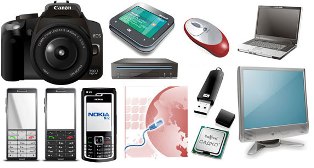Myths about technology

There are many myths and half-truths about technology and as more people start to make use of everyday devices, many of the once-believed-to-be fact stories are myths. Whether you’re convinced that turning your PC off by the power button will damage it or you believe DVDs and CDs are an everlasting media. Here are some of those myths:
Since my email requires a username and password, it is safe?
The webpage into which you input your username and password is almost always SSL encrypted, so it’s safe. But the same cannot be said about the actual email text you send and receive. A competent hacker in your network can ‘read’ the text that is ‘travelling’ between your PC and the email server.
Switching off power without shutting down damages the PC
Many users still to this day believe that switching off power without shutting down will cause physical damage to their hard drives. You will only suffer data loss if data is being currently written (or if your work is not saved) while pressing the power button. However, if your computer hangs, and you are in a hurry to get it working, you need not be paranoid before pressing the reset button.
Email is better for communicating, all the time
Email is certainly better in some situations, but not all the time. While most people have an available connection to email, it is important to note that a traditional phone call will give you far quicker results for important information. If a short answer is needed, it might be better to make use of Instant Messaging or send a message on social networks such as Facebook or Twitter.
You always need to ‘eject’ a USB device before unplugging it
It is a valid statement only under certain conditions. The only reason why users are urged to ‘eject’ the USB before unplugging it is to make sure that whatever data was being transferred has finished copying over – otherwise the data will be corrupted. However, if the USB was plugged in to check on its contents or to move data from it, there is no need to ‘eject’ the USB, as nothing was written to it. Devices like a keyboard, mouse, printers and scanners can be plugged out without having to ‘eject’ them first – provided that they are not switched on.
Having more bars on your cell phone will give you better mobile reception
The signal bars on a mobile phone only indicates the strength of the signal from your mobile phone to the nearest mobile tower, but it is no guarantee that the service will be any better than when the mobile phone only has one bar. Your mobile signal depends on the cell tower, once your signal makes contact with the cell tower; it has to compete against other users through the service provider’s backhaul network – which could lead to poor quality.
Games are too violent for children
Gaming comes in several genres. While some games do contain explicit violence (blood, cries of pain, etc.), these are mostly First Person Shooter (FPS) games in which the player actually ‘shoots’ the enemy.
There are other genres like RTS (Real Time Strategy) in which the player has to think and plan his approach to the game. Then there are racing games in which the player has to drive a car. These kinds of games generally have very less explicit violence, if any. So you need to look for its age rating to find out if it’s good for kids or not.
Smartphones are slow and bulky
A smartphone runs a small operating system, much like your PC (but lighter and less featured) that gives it all the features that the device boasts of, and the ability to install applications to enhance usability. This, of course, requires higher computing power as well as electrical power from the battery. So the two devices used to be slowly and heavy. But now, paired with power efficient and faster processors, smartphones are lighter than and almost as fast in response as a less featured phone.
You need a Digital SLR (DSLR) camera to take great shots
Photography is as much about the photographer as it is about the camera. Framing, the right moment, controlling lighting and position of subjects (though not always possible), the right background, the ability to visualise what looks good through the viewfinder, are all essential factors. When choosing a camera, get one that gives you manual aperture and shutter control.




